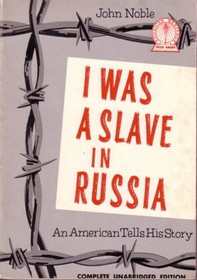John Noble was the son of an American businessman, interned in Dresden under the Nazi regime during World War II. When Soviet troops occupied at the end of the war, John and his father were imprisoned without any charges -- John was eventually sentenced to 15 years labor in a Siberian prison mine.
In his book, he describes 9 years of gruesome mistreatment in the late 1940's and early 1950's. Compared with others I've ready, this title has less political commentary and more historical observation.
The style of writing is easy enough; the accounts of hunger, torture, grief, and death -- prisoners murdering each other without consequence, men being treated worse than animals, a system that rewards corruption and disparages honesty and wisdom -- all were described with a matter-of-fact perspective of a prisoner who had to deal with these realities on a daily basis.
Included in the book are first-person observations about the administration of Soviet prisons and gulags, the physical torture and mistreatment endured by prisoners, the community dynamics and conduct of different sub-groups within the prison system, the Vorkuta Slave Rebellion of 1953.
At the end he comments, "I was returning to the west, to a world of busy people developing their lives according to their abilities...From the Soviet Union, truly the richest country in respect to natural resources, but the poorest nation, I had come to a world of plenty which too often was not appreciated, for which too often gratitude was not expressed to God."
Excellent book. Too bad it's no longer in print...
In his book, he describes 9 years of gruesome mistreatment in the late 1940's and early 1950's. Compared with others I've ready, this title has less political commentary and more historical observation.
The style of writing is easy enough; the accounts of hunger, torture, grief, and death -- prisoners murdering each other without consequence, men being treated worse than animals, a system that rewards corruption and disparages honesty and wisdom -- all were described with a matter-of-fact perspective of a prisoner who had to deal with these realities on a daily basis.
Included in the book are first-person observations about the administration of Soviet prisons and gulags, the physical torture and mistreatment endured by prisoners, the community dynamics and conduct of different sub-groups within the prison system, the Vorkuta Slave Rebellion of 1953.
At the end he comments, "I was returning to the west, to a world of busy people developing their lives according to their abilities...From the Soviet Union, truly the richest country in respect to natural resources, but the poorest nation, I had come to a world of plenty which too often was not appreciated, for which too often gratitude was not expressed to God."
Excellent book. Too bad it's no longer in print...




